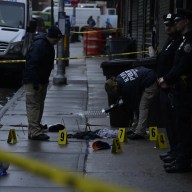By Dustin Brown
When Ted Koppel was prepping his audience for Friday night’s live broadcast of a “Nightline” town meeting in the Queens Boulevard Elks Lodge, he told people to freely express their emotions during a potentially divisive discussion of homeland security.
But beyond an occasional burst of applause, it was not until late in the evening that some of the 300 participants finally got loud, practically booing a Queensboro Bridge engineer who struggled to explain the complicated immigration issues that got him imprisoned for nearly a month.
The hour-and-a-half program, entitled “Homeland Security: At Any Cost,” explored the question of how far we are willing to go and what rights people would give up to protect the country from another attack.
The decision to hold the forum in Queens was a seemingly obvious one with the borough serving as a virtual microcosm of the immigrant groups that have come under intense scrutiny since Sept. 11. The audience included an assortment of people including Trade Center survivors, victims’ families, rescue workers and immigrants.
But the delicacy of the issues, and the rawness of the emotions attached to them, did not fully emerge until Mohammad Irshaid, the Queensboro Bridge engineer, stood to tell of his detainment.
Irshaid, a Palestinian who first came here in 1979 as a student, has legally worked in the United States for years under an H1 worker’s visa. But his papers expired in 1999 while his Green Card application was still stuck in the nation’s unwieldy bureaucracy, where it has sat for more than three years.
He was still waiting when FBI agents picked him up from his Queens Plaza office Nov. 6 and brought him to a prison in New Jersey, where he was held for 23 days without ever being formally charged. He was finally released on $1,500 bond, which he is now waiting to be returned.
“It seems to me from what you have told me … you were here illegally at the time,” Koppel asked, trying to make sense of a narrative that was rambling and somewhat disjointed.
“What is the definition of illegally?” Irshaid replied, eliciting a wave of groans from those sitting around him.
To many, Irshaid appeared to be skirting the issue. He was not supposed to be here, and his plea for sympathy fell on deaf ears at a time of national crisis.
But as Irshaid and his lawyer insist, the issue is a complicated one that not only concerns the violation of immigrants’ civil rights but also points to problems in the nation’s security efforts.
“It’s not uncommon for people to be pending for years,” said his lawyer, Claudia Slovinsky, in a phone interview. “In the meantime, people sometimes run out of the temporary visas while they’re waiting for their Green Cards to come.”
“This is a common scenario for which no one was ever arrested before,” Irshaid said following his television appearance. “If it wasn’t for the Department of Labor being so backlogged for 3 1/2 years, I would have never had to suffer or worry about a visa being expired.”
It is also an issue that came up because he is Palestinian. He said all of the other detainees held in the Passaic County prison with him were Arabs or Muslim, stirring up questions about racial profiling in the government’s security efforts.
“The people who are targeted are people from Arab and Muslim origins, people from other countries are not targeted,” he said. “It is discrimination.”
The government’s backlog in processing Green Card applications is so bad that Congress has tried to address the issue by granting visa extensions — the most recent of which recently put Irshaid back in legal standing, albeit after his lawyer got him out of jail.
Irshaid also said he was picked up on a tip from a disgruntled worker on the bridge, which his attorney described as a common but very flawed strategy that is central to the FBI’s “arbitrary dragnet.”
“It’s a highly erratic, unreliable way of gathering suspects,” Slovinsky said. “This is not making anyone secure. This is to show numbers, this is to show action and violating the detainees’ civil rights right and left.”
The civil rights issues raised by his arrest are ones both Irshaid and his attorney hope to see resolved for the sake of the nation.
Still, the unwelcome reception he got on “Nightline” was something he said was understandable at a time of tension, coming from people who had lost so much.
“They forgot that I am really an innocent man who has never committed a crime in his life and who would do anything to protect the United States,” he said. “My aim and my dream and my hope really is to be able to build a bridge of understanding between different ethnic groups over the world.”
Reach reporter Dustin Brown by e-mail at Timesledger@aol.com or call 229-0300, Ext. 154.


























